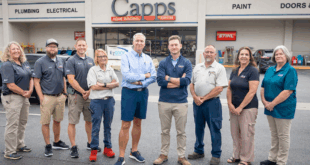David Novak, retired CEO of the company that owns the KFC, Taco Bell and Pizza Hut brands, recently interviewed Ace Hardware’s president and CEO for a podcast on leadership.
John Venhuizen, who is president and CEO of Ace Hardware Corp., answered questions about his professional background, his 25-year career at Ace and what he believes makes a good leader in business.
After graduating from college, Venhuizen worked briefly for an advertising agency before taking a job in Ace’s marketing department. He spent about two decades working in a variety of roles for the co-op before becoming CEO in 2013.
Business leaders should look to the nonprofit sector for inspiration about how to lead people, he tells Novak in the podcast. A pastor at a church, for example, works with volunteers who don’t have job promotions, bonuses or other tangible benefits to motivate them to buy into an organization’s vision, Venhuizen says.
“It’s true leadership without leverage,” he says. “We can learn a lot more from those folks than the other way around.”
He also recommends that leaders prioritize what he calls IRA, or “input, reflection and avoidance.”
For input, he turns to TED Talks, podcasts and books from leaders around the world so he is always learning and growing from other people’s expertise, he says.
Reflection is also important for being a good leader, he says.
“We kind of take pride in that there’s not enough time in the day to do all that we have to do, sort of this self-important thing, and we fail to just unplug and reflect. To just pull away and reflect for a bit. You know, what did I do today? What impact did it have on others? Did I provide hope and encouragement, or was I a discourager?” Venhuizen says.
“I think a lot of leaders don’t do enough of that. There’s too much doing and not enough reflecting and thinking.”
In addition, avoidance involves choosing to dodge opportunities to do or have things that are distractions and reduce the time to reflect, he says.
Ace Hardware’s growth for the past several years is a source of pride for the company, but success can be a defeating force without “productive paranoia,” Venhuizen says.
“It becomes very easy for folks to think, ‘Well, this is great. We’re on a great run. We can just hit cruise control, take our hand off the wheel, take our foot off the gas, get in the back seat. We’ll just coast,’” he says.
“I think that’s a great recipe for death, and so we try to make sure we regularly understand the David and Goliath story all over again because our enemies are really good at what they do.”
Home Depot, Lowe’s and Amazon “are really, really good, well-run companies,” he says. “And the moment we think we can rest on our laurels is the moment they’re going to squash us like a grape.”
His philosophy of working with “productive paranoia” doesn’t mean living in paralyzed fear, he says.
“We’ve got to be productive about that, where you have that heart-racing understanding, like a small business owner, that business is fragile and success can be fleeting,” Venhuizen says.
In addition to using fear to remain competitive in business, leaders also need to encourage, inspire and motivate the people around them without becoming “a cheerleader nobody respects,” he says.
Knowing when to offer encouragement and when to critique constructively, pushing for improvement, is “an imperfect science,” he says.
A leader also finds ways to help his or her team to buy into a company’s values, such as Ace’s ideals for a constant pursuit of world-class customer service, he says.
“I do believe it starts with communication,” he says. “We have to have a strategy that is clear and smart, and it needs to be communicated in a compelling way that people understand and get [excited] about.”
 Hardware Retailing The Industry's Source for Insights and Information
Hardware Retailing The Industry's Source for Insights and Information






